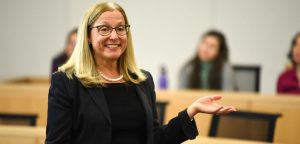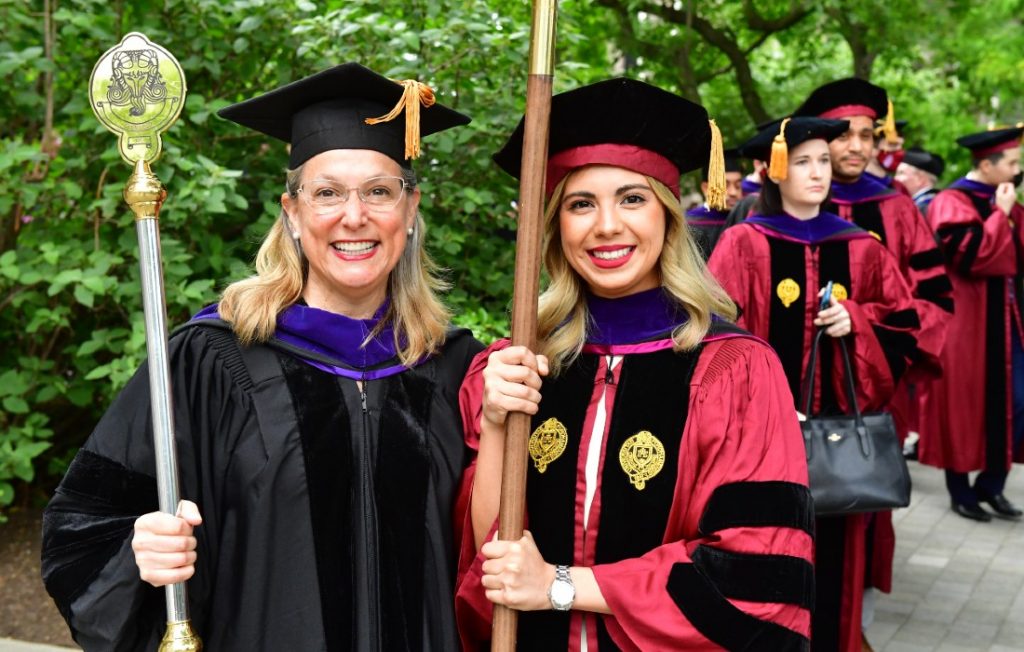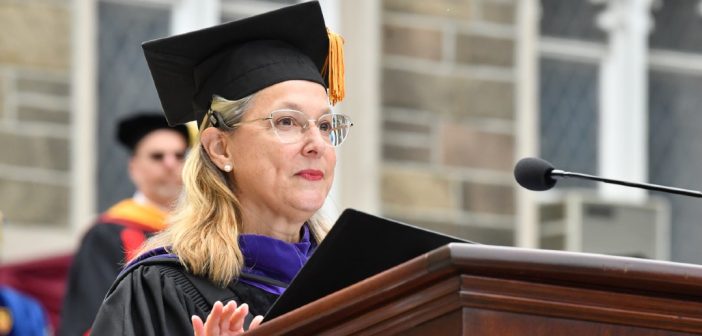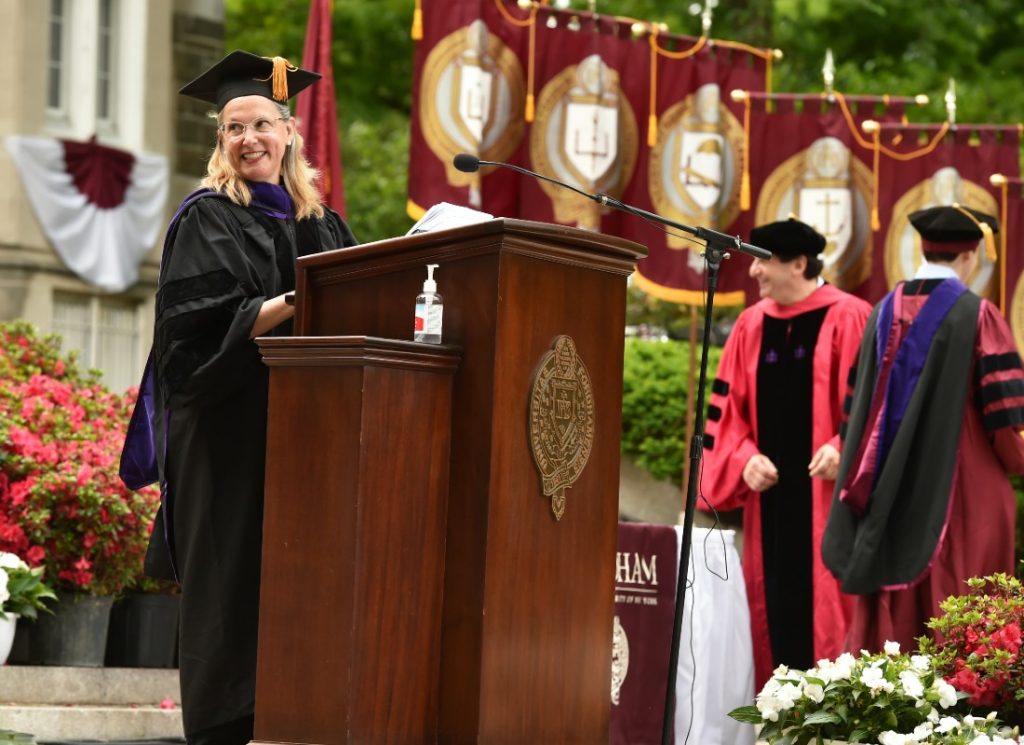In her role as associate dean for academic affairs over the past four years, Linda Sugin has been instrumental in spearheading a number of key strategic initiatives that have transformed the student experience at Fordham Law School. Some of her most notable accomplishments include navigating the pandemic and the move from in-person to virtual learning, launching the Law School’s signature professionalism programs—the peer mentorship program and the 1L house system—and rethinking orientation.
As Sugin steps aside as associate dean to pass the baton to Professor Joseph Landau, she will return to full-time teaching while also continuing to lead Fordham Law’s innovative initiatives in the area of professionalism and wellness.
In recognition of her impact at the Law School, Sugin was given the Dean’s Medal of Recognition—the highest honor the dean of Fordham Law School can bestow—at the 114th diploma ceremony held on May 23, 2021.
“I am grateful to you for your extraordinary vision, the clarity of your values and thinking, your straightforward advice, your tremendously hard work and your constant dedication to our students,” said Dean Matthew Diller in his presentation of the medal. “To you, the students are our North Star, nurturing them to go out there and thrive always comes first—and I thank you for that.”
Navigating the Pandemic
When the pandemic shut New York City down, forcing the closure of the Lincoln Center campus, Sugin immediately spearheaded the creation of a pedagogy committee involving some 30 faculty members. The committee strategized the transition to virtual instruction and provided a forum for faculty members to share their experiences and offered advice to one another on what worked and what did not.
In a dual role of associate dean and co-leader of Fordham Law’s COVID-19 working group, Sugin guided the Law School’s academic program through the pandemic, keeping the school open with substantially reduced in-person capacity. She oversaw the transition to online learning in March 2020, and the return to partial in-person instruction for Fall 2020.
Professor Clare Huntington, who has worked closely with Sugin throughout her tenure in the position, noted how Sugin quickly focused on the pedagogical challenges of online education—including the massive, uncertain tasks that lie ahead of her and the rest of the Fordham Law community. “Within days, she gathered faculty to begin sharing ideas and experiences, to ensure that we were learning from each other as quickly as possible,” she said. “She then supported these efforts throughout the summer and into the past school year, always focused on the quality of the education students were receiving.
“Dean Sugin has a holistic understanding of the skills lawyers need to succeed, as illustrated by her focus on professionalism and mentorship,” Huntington added. “She developed innovative programs that address a broad range of needs, and she has implemented these with immense dedication and attention.”
Fordham Law also hosted its first-ever virtual advising “gala” over Zoom in late May 2020 to help 2Ls navigate decisions about their fall 2020 courses and beyond. Because most of the spring semester’s in-person events were canceled, and course registration was rescheduled for the summer, the need for an advising event was greater than normal.
Throughout the last year and a half of the pandemic, Sugin remained committed to guiding the Law School’s academic program—collaborating with faculty and administrators to create a teaching schedule that worked for students and faculty and helped to keep the Fordham Law community safe while enabling learning to continue.

Associate Dean Sugin helped organize Fordham Law’s first spring orientation for 1L students returning from their winter break in January 2020.
Reimagining Life at Fordham Law
Fordham Law’s house system launched successfully during the 2019-20 academic year in an effort to build a stronger community for students. It aims to enhance the student experience by creating smaller communities of support within the Law School. The house system also provides students with a curated co-curriculum consisting of lessons, resources, and information they need while navigating their first year.
The house system has grown under Sugin’s leadership, becoming an integrated support system for first-year students that engages faculty, administrators, and upper-level students. It is the vehicle for a professionalism and wellness curriculum, upper-level student peer mentorship, information delivery, and social activities.
Sugin reconceptualized aspects of the Law School’s August orientation for incoming students to focus on professional identity development and emotional preparation for law school. These new elements of the August orientation were introduced in 2018 and continue to develop. They were crafted to supplement and dovetail with other academic-focused programs in orientation—including Quantitative Methods for Lawyers, a four-part course on quantitative tools that lawyers need to understand, which Sugin spearheaded in 2014 and continues to lead.
In fall 2019, Sugin worked with the full-time faculty to add diversity, equity, and inclusion (DEI) training to full-time faculty development. She also implemented mandatory DEI training for all adjunct faculty prior the fall 2020 semester began. During that time, she also chaired a committee of faculty, students, alumni, and administrators to search for the Law School’s Assistant Dean of Students and Diversity and recruited Kimathi Gordon-Somers to the role in February 2020.
In January 2020, Sugin helped organize the Law School’s first spring orientation for first-year law students returning from their winter break. The orientation remains a part of Fordham Law’s commitment to making professionalism a core part of legal education and is a day-long event focused on DEI—a crucial component of professionalism education for law students.
The Power of Professionalism
The new emphasis on professionalism reflects Sugin’s vision for expanding the scope of legal education to include emotional support, leadership training, and essential skills that are not traditionally included in the law school curriculum.
In 2019, Sugin created the position of the director of professionalism and recruited Jordana Confino into the role to bring wellness expertise and a greater focus on student mental health to the Law School, within the umbrella of academic affairs. Sugin and Confino have collaborated closely on all aspects of the office of professionalism’s work.
“Perhaps the most distinguishing aspect of Linda’s Deanship has been her unwavering commitment to optimizing the law student experience, and her understanding that doing so requires going far beyond the confines of traditional legal education,” Confino said. “It has been a true privilege to work with her on these projects, and I look forward to continuing our collaboration in her new role as faculty director of the professionalism office.”
Sugin proposed that a new professionalism fellows program be part of the House System and serve as a leadership-training initiative that gives select upper-level students opportunities to work in the houses with faculty and administrators crafting programming, solving problems, and providing advice to first-year students. It was launched in 2020 with six upper-year students interested in and committed to promoting professionalism, mentorship, and inclusion within Fordham Law.
Former professionalism fellow and Student Bar Association Vice President Cristina Lombardi ’21 said Sugin’s concern for students did not go unnoticed by her and the other SBA members. “She’s incredibly supportive of students and cares immensely about what students think and what they want to get out of law school,” Lombardi explained. “And after asking the probing questions, she works to actually help them achieve specific goals or implement specific changes at the law school.”
One conversation that has since stuck with Lombardi occurred in November 2019, when Sugin rhetorically asked the SBA, “What are you going to do and leave your mark on this law school?” Lombardi then began to think about innovative ways students could advocate for and implement changes at Fordham Law to make the school a better place.
“She prioritized students’ concerns and was always receptive. If I had an idea about something, she’d either be there to work through it or would point me in the directions of people I should speak to,” Lombardi said. “I genuinely felt her sincerity and appreciated how she created an open door and always asked, ‘How can I assist you to get there?'”

Associate Dean Sugin with Student Bar Association President Megan Negron ’21, moments before the in-person commencement event at Fordham University’s Rose Hill campus began on May 24, 2021.
Promoting Peer Mentorship
Sugin envisioned, implemented, and taught Fordham Law’s peer mentorship program and related leadership class, in which many members of the class of 2021 have participated.
Launched in 2018, the program is a community-building initiative and support system for upper-level students at Fordham Law. It is designed to meet the needs of students starting their second year of law school, which is highly unstructured and presents students with unique challenges compared to the first year.
The peer mentorship program’s single defining feature is an academic course for mentors, which was developed and taught by Sugin and adjunct teachers under her supervision. The course supports mentors as a collaborative community, as well as builds skills and confidence through readings, exercises, and written reflections.
In 2020, the peer mentorship program joined forces with student affinity groups to strengthen both intra-cultural and inter-cultural mentoring at the Law School.
Focusing on Student Needs
Academic support was another focus of Sugin’s attention as associate dean. Working with the office of student affairs, Sugin helped redesign academic support and made it more available earlier in a student’s law school career and more useful by focusing narrowly on student needs.
Under her leadership, the Law School introduced a January term that was designed to offer students small-credit courses in a condensed time frame, as well as a remote-learning pilot project for J.D. students that added two partially online courses to the evening schedule for J.D. students
Sugin also worked with the faculty to create a policy that defines the role of student teaching assistants in large classes. By supporting the widespread employment of student teaching assistants and the commitment of resources to them, she encouraged faculty to create more opportunities for formative assessment and feedback for students, particularly in their first year.
Sugin managed the design, development, and introduction of the Fordham Law’s online MSL degree in compliance—its first fully online academic program. Prior to the university’s partnership with 2U, Sugin investigated the different possible approaches to launching an online degree program, and created the curriculum and degree requirements in collaboration with Assistant Dean Toni Jaeger-Fine.
“Linda’s efforts have significantly enhanced the curricular and extracurricular dimensions of our school,” said Professor Joseph Landau. “Owing to her dedication, Fordham is a stronger and more inclusive institution, and our students are better prepared than ever to put their legal education in the service of others.”





